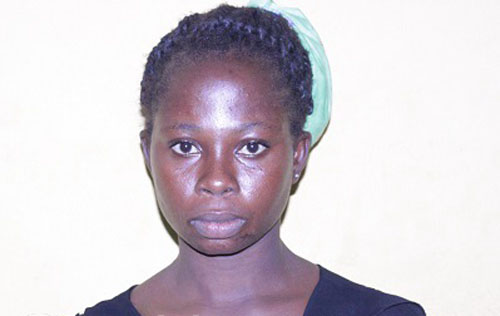Maame Bono
The snail seller from whom Major Mahama asked direction to Denkyira Obuase (now New Obuase) before he was allegedly mistaken for an armed robber and lynched, has told an Accra High Court that she blamed herself for the soldier’s death.
Akosua Takyeiwaa aka Mama Bono, who is the second prosecution witness, yesterday, ended her testimony in the trial of 14 persons before the court for the gruesome murder of the soldier.
During cross-examination, she conceded that because she was the one who raised a ‘false alarm’ about the soldier possessing a gun, so she blamed herself for the turn of events.
The witness was one of three women who were selling by the side of the road when the fallen soldier who was on a 20-kilometre walk approached her for direction.
She told the court during her evidence-in-chief led by Evelyn Keelson, a chief state attorney, that after the deceased had asked for the direction and turned around, she saw a gun on his waist and upon seeing the gun she became suspicious.
She said she then decided to call William Baah the assemblyman, who is a suspect in the trial to inform him of what she had seen.
It was after her call during which she raised a false alarm that the late Major Mahama was allegedly lynched by the 14 suspects who are currently before the court charged with murder and abetment to murder.
She said she fled to Ivory Coast after the lynching as a result of the fear that had gripped residents of the area but was later arrested when she returned to her hometown and reported herself to the police.
Asked by defence lawyer, Patrick Anim-Addo, whether she was blaming herself for the murder of the late soldier whiles she was in police custody, Mrs. Takyeiwaa said, “yes.”
She said she was later brought to Accra for interrogations and was later told she will not be charged for court.
Upon the request of another lawyer, Augustine Gyamfi, the witness confirmed to the court that she was not at the crime scene and did not see any of the accused persons kill the late Major Mahama.
Asked why she decided to call the assemblyman and not the police when she saw the gun around the waist of the deceased, the witness said she did not have any contacts to the police in the area.
George Bernard Shaw, lawyer for six of the accused persons including the assemblyman, asked the witness whether there were series of armed robbery cases in the area days before the lynching of the soldier and she responded “yes.”
She narrated that a day before the gruesome incident, there was a robbery in the area where the robbers ransacked different homes and made away with various items but nobody was arrested.
Asked what exactly she told the assemblyman when she called him, Mrs. Takyeiwaa told the court that she reported seeing the gun and because she became suspicious, she asked him to check up the person carrying the gun around his waist.
She said although there was a robbery the previous night and the residents, including herself, were leaving in fear, she did not mistake the late Major Mahama for an armed robber when she saw the gun around his waist.
She also confirmed that following the death of the soldier the whole town was living in fear because there were rumours that soldiers were storming the place to avenge the death of their colleague.
She, however, told the court that she did not see any military personnel in the town although she heard they came.
During cross-examination, the name of a certain man who was only identified as ‘Tipper’ came up and it turned out that he had left a gun near a shed where the women were selling by the roadside moments after Major Mahama had left the place.
The witness said she did not have any conversation with the said Tipper and could not tell if there was any form of conversation between Tipper and the deceased.
Mrs. Takyeiwaa was discharged by the court presided over by Justice Mariama Owusu. Hearing continues on July 3, 2018.
BY Gibril Abdul Razak and Shuaib Ali


